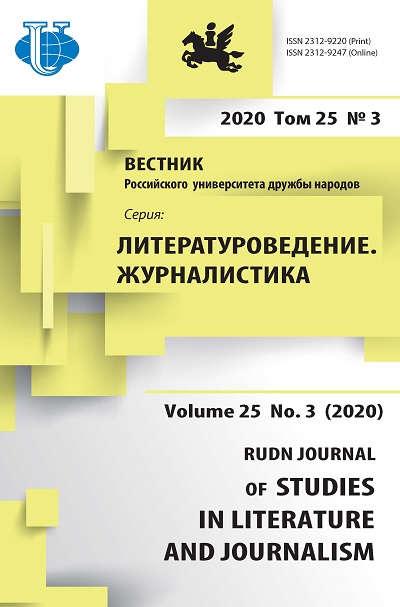National features of the popularization of science in Russia: historical background and current condition
- Authors: Penzina A.I.1
-
Affiliations:
- Peoples’ Friendship University of Russia (RUDN University)
- Issue: Vol 25, No 3 (2020)
- Pages: 589-597
- Section: REVEWS. BOOK REVIEWS
- URL: https://journals.rudn.ru/literary-criticism/article/view/24835
- DOI: https://doi.org/10.22363/2312-9220-2020-25-3-589-597
- ID: 24835
Cite item
Full Text
Abstract
The article discusses the current topic of the popularization of science and the features of its dissemination through the media. Science began to develop more rapidly. A lot of new research is causing great interest among people. But often, scientific works remain only the property of the scientific community. The article is a phased analysis of the historical and modern features of the popularization of science in Russia, including the development of the popular science genre. The author gives a model developed by the domestic researcher A. Vaganov. Based on the proposed model of A. Vaganov, it is concluded that today the audience is again faced with scientific knowledge in an unscientific environment. There is an increase in interest in the so-called “popular science”, but not in science. The article reveals the key elements of the system of popularization of science in Russia, in which the media play a special role. The popularization of science in Russia today is becoming more efficient thanks to the participation of journalists. Meanwhile, a problem arises because it is sometimes difficult for a journalist to understand the coverage of such a broad topic as science, which unites several dozen different areas.
About the authors
Anatasiya I. Penzina
Peoples’ Friendship University of Russia (RUDN University)
Author for correspondence.
Email: an.penzina1703@gmail.com
Ph.D. student of the Department of Theory and History of Journalism of the Faculty of Philology
6 Miklukho-Maklaya St, Moscow, 117198, Russian FederationReferences
- Perechen' poruchenij po itogam vstrechi s predstavitelyami obshchestvennosti v Cherepovce: Prezident utverdil perechen' poruchenij po itogam vstrechi s predstavitelyami obshchestvennosti, sostoyavshejsya v Cherepovce 4 fevralya 2020 goda [List of instructions following a meeting with members of the public in Cherepovets: The President approved a list of instructions following a meeting with members of the public held in Cherepovets on February 4, 2020]. (n.d.). Retrieved May 5, 2020, from http://kremlin.ru/acts/ assignments/orders/63196 (data obrashcheniya: 05.05.2020).
- Istochniki informacii: Predpochteniya. Opros Fonda obshchestvennogo mneniya [Sources of information: preferences. Public Opinion Foundation survey]. (n.d.). Retrieved May 5, 2020, from https://fom.ru/SMI-i-internet/14256
- Valkova, O.A. (2007). Estestvenno-nauchnaya periodicheskaya pechat' Rossii kak istoricheskij istochnik (XVIII – nachalo XX v.) [Natural-scientific periodicals of Russia as a historical source (XVIII – early XX century)]. Arhiv istorii estestvoznaniya i tekhniki [Archive of the history of natural science and technology], (III), 427–428.
- Vaganov, A.G. (2016). Evolyuciya form populyarizacii nauki v Rossii: XVIII–XXI vv. [Evolution of forms of popularization of science in Russia: XVIII–XXI centuries]. Upravlenie naukoj i naukometriya [Science and scientometry management] (no. 3). Retrieved May 6, 2020, from https://cyberleninka.ru/article/n/evolyutsiya-form-populyarizatsii-nauki-v-rossii-xviii-xxi-vv
- Mokir Dz. (2012). Dary Afiny. Istoricheskie istoki ekonomiki znanij [Gifts of Athena. Historical origins of the knowledge economy]. Moscow, Izdatel’stvo Instituta Gajdara Publ.
- Danilevskij, V.V. (1954). Russkaya tekhnicheskaya literatura pervoj chetverti XVIII v. [Russian technical literature of the first quarter of the 18th century]. Moscow, Leningrad, Izdatel’stvo Akademii nauk SSSR Publ.
- Razgon, L. (1962). Chelovek, napisavshij biblioteku [The Man Who Wrote the Library]. Puti v neznaemoe. Pisateli rasskazyvayut o nauke [Paths to the unknown. Writers talk about science] (issue 2). Moscow, Sovetskij pisatel' Publ.
- Esenkin, B.S., & Majsuradze, Yu.F. (2001). Knizhnyj rynok Rossii: 1990–2000 gg. Dinamika, ekonomika, organizaciya [Russian book market: 1990–2000 Dynamics, economics, organization]. Moscow, MGUP Publ.
- TOP-15 samyh citiruemyh SMI nauchno-populyarnoj tematiki – II kvartal 2019 [TOP-15 most cited media on popular science topics – II quarter of 2019]. (n.d.). Medialogiya. Retrieved May 5, 2020, from https://www.mlg.ru/ratings/media/sectoral/6780/
- Viktorova, L. (2012). Interes k nauke: Dajte mikroskop! [Interest in science: Give me a microscope!]. Himiya i zhizn' – XXI vek [Chemistry and life – XXI century], (5), 18.
- Rossiya − strana tekhnooptimistov: Opros Vserossijskogo centra izucheniya obshchestvennogo mneniya [Russia is a country of techno-optimists: Poll by the All-Russian Public Opinion Research Center]. (n.d.). Retrieved May 6, 2020, from https://wciom.ru/ index.php?id=236&uid=10151
- Suhenko, N.V. (2016). Specifika populyarizacii nauki v Rossii [Specificity of science popularization in Russia]. Vestnik NGTU imeni R.E. Alekseeva. Seriya: Upravlenie v social'nyh sistemah. Kommunikativnye tekhnologii [Bulletin of NSTU named after R.E. Alekseev. Series: Management in social systems. Communication technologies] (no. 4). Retrieved May 6, 2020, from https://cyberleninka.ru/article/n/spetsifika-populyarizatsii-nauki-v-rossii
- Gross, L. (2017). The Science Writers' Investigative Reporting Handbook: A Beginner's Guide to Investigations. USA, Watchdog Press, Kensington, California.
- Centr nauchnoj kommunikacii universiteta ITMO [Center for Scientific Communication of ITMO University]. (n.d.). Retrieved May 6, 2020, from https://itmo.ru/ru/viewunit/ 90523/centr_nauchnoy_kommunikacii.htm
Supplementary files















